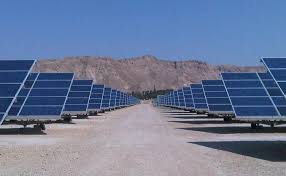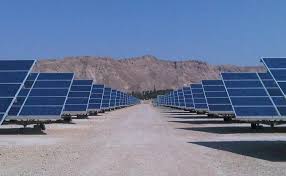
Expecting to capitalize on the Trump administration's emphasis on "fighting Jihadism" is Israeli-American solar power generation company Energiya Global. Half of his company's projected pipeline of some 1500 Megawatt of solar power in Africa over the next five years, is in places "where the U.S. likes to counter extremist forces", Chief Executive Yosef Abramowitz said in a TV interview.
Abramowitz was in Copenhagen, where he attended the Africa Energy Forum, an international power industry investors' meet-up straight from a week in Liberia, where he accompanied visiting Israeli Prime Minister Benjamin Netanyahu. He took a freshly-signed $20 million solar field deal from Liberia directly to his "debt and equity sponsors" at the forum, he says.
Last week end, Energiya made a $1 billion deal in solar projects in the Economic Community of West African States, ECOWAS, area and the Liberia contract is part of that announcement. Abramowitz explains that: "It is a commitment by Energiya Global to deploy $1 billion in investments over the next 4 years in ECOWAS member states through the ECOWAS energy commission."
Most of that investment will be underwritten by World Bank and U.S. guarantees and is in the form of debt that is to be funded largely by international development banks. The projects come in addition to about 1000MW that exist in Energiya's current pipeline of projects in Africa and will amount to some 500MW of mostly solar power generation with some wind and mini-hydro power mixed in as well.
Abramowitz says that Energiya is eminently placed to bring solar power to the African continent and the company is registered in Israel but has a majority of its stock held by U.S. citizens. Before co-founding Energiya he was involved in setting up the Arava solar power fields in Israel and is a U.S. émigré to Israel. He was also an Israeli negotiator at the Paris climate conference in 2015.
No significant impact on his company is expected by him from the Trump administration’s withdrawal of the U.S. from the Paris climate accord. Abramowitz says that The U.S. mechanisms "make money for the U.S. taxpayer," and examples of such mechanisms include OPIC, the Overseas Private Investment Corporation, and USAID's PowerAfrica program.
He explains that for the kind of projects that Energiya pursues, the Paris climate deal has made a lot of money available. "Most people don't realize that it wasn't only a climate deal, it was also a development deal, particularly for Africa."
Abramowitz says that in developing markets post-Paris, the situation with solar power is such that: "There is nearly unlimited debt today for these projects and the development banks are begging for a bankable deal flow. So it's a buyers' market if you know how to do this and we have a good track record."
Abramowitz says that it is put in a good position to operate in Africa due to Energiya's Israeli background and close cooperation with U.S. programs.
Israel's security mindset and experience is also very significant. "We come with a unique understanding of security. Seven of the ECOWAS countries, for example, are frontline states with Islamic Jihadism. Most developers wouldn't know how to handle that, from a physical security perspective and also from a financial security one."
(Source:www.cnbc.com)
Abramowitz was in Copenhagen, where he attended the Africa Energy Forum, an international power industry investors' meet-up straight from a week in Liberia, where he accompanied visiting Israeli Prime Minister Benjamin Netanyahu. He took a freshly-signed $20 million solar field deal from Liberia directly to his "debt and equity sponsors" at the forum, he says.
Last week end, Energiya made a $1 billion deal in solar projects in the Economic Community of West African States, ECOWAS, area and the Liberia contract is part of that announcement. Abramowitz explains that: "It is a commitment by Energiya Global to deploy $1 billion in investments over the next 4 years in ECOWAS member states through the ECOWAS energy commission."
Most of that investment will be underwritten by World Bank and U.S. guarantees and is in the form of debt that is to be funded largely by international development banks. The projects come in addition to about 1000MW that exist in Energiya's current pipeline of projects in Africa and will amount to some 500MW of mostly solar power generation with some wind and mini-hydro power mixed in as well.
Abramowitz says that Energiya is eminently placed to bring solar power to the African continent and the company is registered in Israel but has a majority of its stock held by U.S. citizens. Before co-founding Energiya he was involved in setting up the Arava solar power fields in Israel and is a U.S. émigré to Israel. He was also an Israeli negotiator at the Paris climate conference in 2015.
No significant impact on his company is expected by him from the Trump administration’s withdrawal of the U.S. from the Paris climate accord. Abramowitz says that The U.S. mechanisms "make money for the U.S. taxpayer," and examples of such mechanisms include OPIC, the Overseas Private Investment Corporation, and USAID's PowerAfrica program.
He explains that for the kind of projects that Energiya pursues, the Paris climate deal has made a lot of money available. "Most people don't realize that it wasn't only a climate deal, it was also a development deal, particularly for Africa."
Abramowitz says that in developing markets post-Paris, the situation with solar power is such that: "There is nearly unlimited debt today for these projects and the development banks are begging for a bankable deal flow. So it's a buyers' market if you know how to do this and we have a good track record."
Abramowitz says that it is put in a good position to operate in Africa due to Energiya's Israeli background and close cooperation with U.S. programs.
Israel's security mindset and experience is also very significant. "We come with a unique understanding of security. Seven of the ECOWAS countries, for example, are frontline states with Islamic Jihadism. Most developers wouldn't know how to handle that, from a physical security perspective and also from a financial security one."
(Source:www.cnbc.com)





